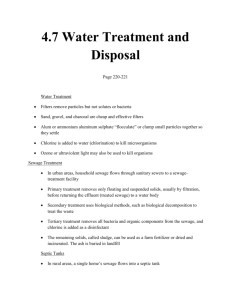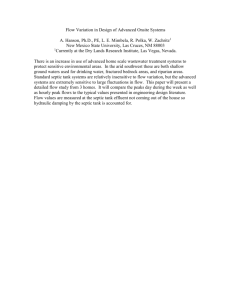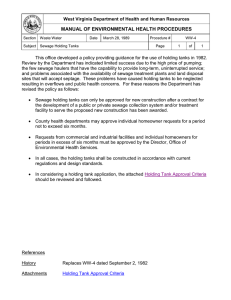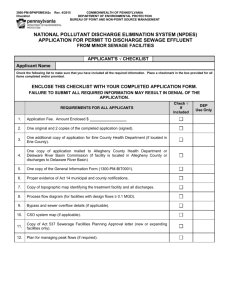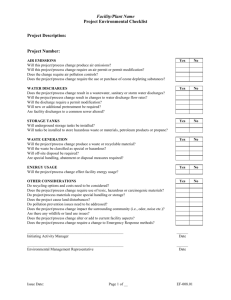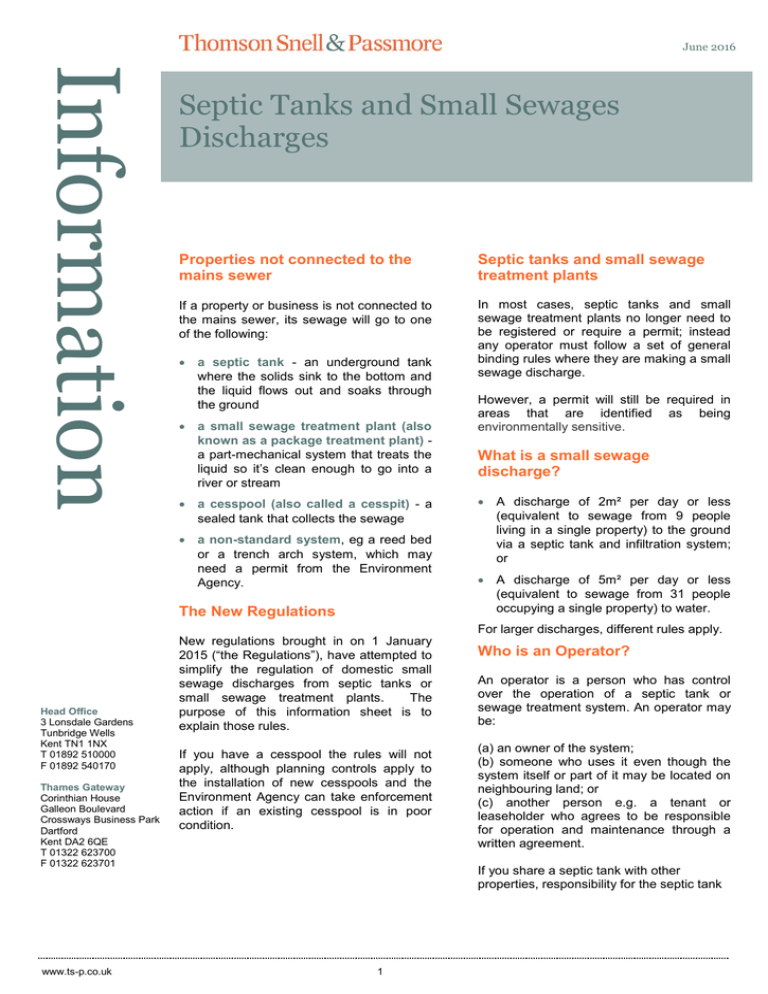
June 2016
Information
Septic Tanks and Small Sewages
Discharges
Properties not connected to the
mains sewer
Septic tanks and small sewage
treatment plants
If a property or business is not connected to
the mains sewer, its sewage will go to one
of the following:
In most cases, septic tanks and small
sewage treatment plants no longer need to
be registered or require a permit; instead
any operator must follow a set of general
binding rules where they are making a small
sewage discharge.
a septic tank - an underground tank
where the solids sink to the bottom and
the liquid flows out and soaks through
the ground
a small sewage treatment plant (also
known as a package treatment plant) a part-mechanical system that treats the
liquid so it’s clean enough to go into a
river or stream
a cesspool (also called a cesspit) - a
sealed tank that collects the sewage
a non-standard system, eg a reed bed
or a trench arch system, which may
need a permit from the Environment
Agency.
The New Regulations
However, a permit will still be required in
areas that are identified as being
environmentally sensitive.
What is a small sewage
discharge?
A discharge of 2m² per day or less
(equivalent to sewage from 9 people
living in a single property) to the ground
via a septic tank and infiltration system;
or
A discharge of 5m² per day or less
(equivalent to sewage from 31 people
occupying a single property) to water.
For larger discharges, different rules apply.
Head Office
3 Lonsdale Gardens
Tunbridge Wells
Kent TN1 1NX
T 01892 510000
F 01892 540170
Thames Gateway
Corinthian House
Galleon Boulevard
Crossways Business Park
Dartford
Kent DA2 6QE
T 01322 623700
F 01322 623701
www.ts-p.co.uk
New regulations brought in on 1 January
2015 (“the Regulations”), have attempted to
simplify the regulation of domestic small
sewage discharges from septic tanks or
small sewage treatment plants.
The
purpose of this information sheet is to
explain those rules.
If you have a cesspool the rules will not
apply, although planning controls apply to
the installation of new cesspools and the
Environment Agency can take enforcement
action if an existing cesspool is in poor
condition.
Who is an Operator?
An operator is a person who has control
over the operation of a septic tank or
sewage treatment system. An operator may
be:
(a) an owner of the system;
(b) someone who uses it even though the
system itself or part of it may be located on
neighbouring land; or
(c) another person e.g. a tenant or
leaseholder who agrees to be responsible
for operation and maintenance through a
written agreement.
If you share a septic tank with other
properties, responsibility for the septic tank
1
June 2016
Septic Tanks and Small Sewages Discharges
Continued
and its discharge and for complying with the
general binding rules is a shared
responsibility, unless you have a written
agreement which states otherwise.
What is an existing discharge?
If the discharge was already being made
before 31 December 2014, it is an existing
discharge. If you have upgraded or replaced
your treatment system (or are planning to
do so) but still make the discharge to the
same place, then this is still an existing
discharge.
What is a new discharge?
A new discharge is one that was started
after 1 January 2015. If you have upgraded
or replaced your existing treatment system
(or are planning to do so) and make the
discharge to a different place, then this
would be classed as a new discharge.
The General Binding Rules
Under the Regulations anyone who has a
domestic septic tank or small sewage
treatment plant will be expected to follow a
set of rules (“the General Binding Rules”)
whether or not a permit is required.
The rules apply to all sewer discharges and
include specific regulations depending on
whether sewage is discharged to drainage
water or via an infiltration system or
drainage field.
There are also additional rules which only
apply to new discharges.
Rules applicable to all small
sewer discharges:
The system must be installed and
operated in accordance with the
manufacturer’s specification and be
large enough to handle the maximum of
sewage that it will need to treat;
Maintenance must be undertaken
regularly.
Records
(for
example,
maintenance,
tank
emptying
and
servicing receipts) must be kept for 5
years (you should pass any records on
to the new occupier if you move house);
Waste sludge from the system must be
safely disposed of by a registered waste
carrier, a minimum of once a year; and
The discharge must not cause pollution
of surface water or groundwater.
Additional rules also contain detailed
technical information on the size and siting
of a discharge. It is therefore advisable to
obtain a septic tank/drainage survey from a
qualified drainage expert to ascertain
whether the drainage system is compliant,
suitable for the property and in satisfactory
condition.
Guidance can be found at
https://www.gov.uk/permits-you-need-forseptic-tanks/overview.
Permit Requirements
Permits will continue to be used in areas
designated as environmentally sensitive; the
Environment Agency will be able to tell you
if a particular area is designated as
environmentally sensitive.
Households and businesses located in an
area nearest to a groundwater drinking
www.ts-p.co.uk
2
June 2016
Septic Tanks and Small Sewages Discharges
Continued
water supply (known as a groundwater
source protection zone 1 or SPZ1) will be in
environmentally sensitive areas.
Permits will also be required where systems
are not able to meet the General Binding
Rules.
The Environment Agency will grant a permit
if there is:
no evidence of pollution; or
the risk of pollution is acceptable
If there is evidence of pollution or the risk of
pollution is unacceptable the Environment
Agency will ask you to make changes to
your system and may issue a permit with
improvement conditions.
The current permit application charge for a
small sewage discharge is £125.
carrying out remedial works;
other civil and financial sanctions
including Fixed Penalty Notices; and
prosecution and
prosecution.
orders
ancillary to
Property sellers
Property sellers must provide the purchaser
with a written notice if a property has a
septic tank or small sewage treatment plant.
The notice must include details of the
location, maintenance and a description of
the waste water system. In most cases this
information is included within property
information forms that are completed as part
of the conveyancing process.
Further information
Enforcement
The Environmental Agency has said that if it
identifies a small sewage discharge which
requires a permit, its first course of action
will always be to provide advice and
guidance to help the operator make a permit
application.
If you are granted a permit but the
Environment Agency finds that your system
may be causing pollution to surface or
groundwater it will contact you to discuss
the issues. The formal options that the
Environment Agency has include, amongst
others:
This information sheet is not intended to be
a substitute for specific advice and is for
general guidance only. It is based upon our
understanding of the legal position as at
June 2016 and may be affected by
subsequent changes in the law.
For more information please contact Sarah
Easton on 01892 510000 or email at:
sarah.easton@ts-p.co.uk
© Thomson Snell & Passmore LLP
issuing a warning;
statutory enforcement notices and works
notices;
suspension
or
revocation
environmental permits;
www.ts-p.co.uk
injunctions;
3
of
All Rights Reserved

